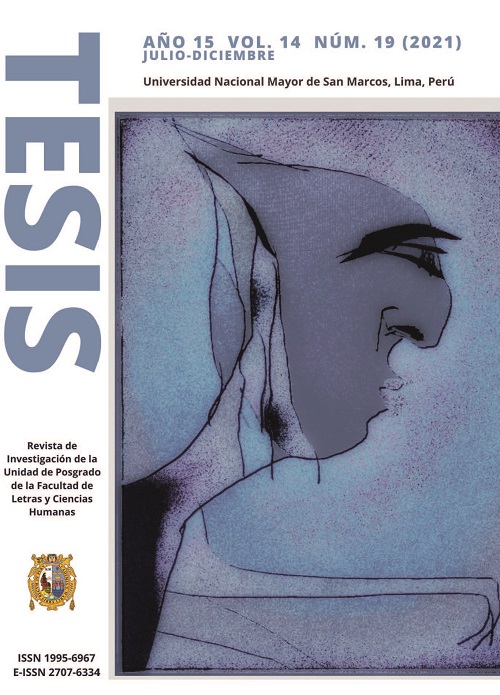Imposible, pero no problemático: comprendiendo la adopción con teoría dialógica de tipos
DOI:
https://doi.org/10.15381/tesis.v14i19.21937Palabras clave:
problema de la adopción, dialógica, teoría constructiva de tipos, antiexcepcionalismo, semánticas lúdico-teóricasResumen
Las leyes de la lógica no pueden adoptarse, tal como sostiene el problema de la adopción de Kripke y Padró. Su argumento puede interpretarse como una invitación a revisar la forma en que relacionamos la lógica con la práctica inferencial: la primera no viene antes, sino después de la segunda. En este artículo profundizo en esta conclusión mostrando cómo la imposibilidad de la adopción puede ser asociada muy naturalmente con algunas características de immanent reasoning, un cruce entre la lógica de diálogos y la teoría intuicionista de tipos que incorpora elementos pragmáticos en el corazón de su formalismo. La observación más importante de esta aproximación es que la adopción, aunque todavía imposible, ya no es necesaria; y, por lo tanto, el “problema” deja de ser “problemático”. Esto ilustra algunas de las ventajas de favorecer una aproximación lúdico-teórica a la semántica de la lógica filosófica.
Referencias
Beall, J. C., Restall, G. (2006). Logical pluralism. Oxford University Press. https://doi.org/10.1093/acprof:oso/9780199288403.001.0001
Berger, A. (2011). Kripke on the incoherency of adopting a logic. In A. Berger (Ed.), Saul Kripke (pp. 177-207). Cambridge University Press. https://doi.org/10.1017/CBO9780511780622.009
Blass, A. (1992). A game semantics for linear logic. Annals of Pure and Applied logic, 56(1-3), 183-220. https://doi.org/10.1016/0168-0072(92)90073-9
Clerbout, N. (2014). Finiteness of plays and the dialogical problem of decidability. IfCoLog Journal of Logics and their Applications, 1(1):115-140.
Ferrari, F. and Orlandelli, E. (2021). Proof-theoretic pluralism. Synthese, 198, 4879-4903. https://doi.org/10.1007/s11229-019-02217-6
Finn, S. (2019). The adoption problem and anti-exceptionalism about logic. The Australasian Journal of Logic, [S. I.], 16(7), 231-249. https://doi.org/10.26686/ajl.v16i7.5916
Kamareddine, F. D., Laan, T. and Nederpelt, R. (2004). A modern perspective on type theory: from its origins until today (Vol. 29). Springer Science & Business Media. https://doi.org/10.1007/1-4020-2335-9
Keiff, L. (2007). Le pluralisme dialogique: Approches dynamiques de l’argumentation formelle. [PhD thesis, Université de Lille].
Padró, R. (2015). What the tortoise said to Kripke: The adoption problem and the epistemology of logic. CUNY Academic Works. [PhD thesis, City University of New York]. https://academicworks.cuny.edu/gc_etds/603
Quine, W. (1986). Philosophy of logic. (2nd ed.). Harvard University Press. https://doi.org/10.2307/j.ctvk12scx
Rahman, S., McConaughey, Z., Klev, A. and Clerbout, N. (2018) Immanent reasoning or equality in action. A plaidoyer for the player level. Springer. https://doi.org/10.1007/978-3-319-91149-6
Descargas
Publicado
Número
Sección
Licencia
Derechos de autor 2021 Miguel Álvarez Lisboa

Esta obra está bajo una licencia internacional Creative Commons Atribución 4.0.
LOS AUTORES RETIENEN SUS DERECHOS:
a. Los autores retienen sus derechos de marca y patente, y también sobre cualquier proceso o procedimiento descrito en el artículo.
b. Los autores retienen el derecho de compartir, copiar, distribuir, ejecutar y comunicar públicamente el artículo publicado en la revista Tesis (Lima) (por ejemplo, colocarlo en un repositorio institucional o publicarlo en un libro), con un reconocimiento de su publicación inicial en la revista Tesis (Lima).
c. Los autores retienen el derecho a hacer una posterior publicación de su trabajo, de utilizar el artículo o cualquier parte de aquel (por ejemplo: una compilación de sus trabajos, notas para conferencias, tesis, o para un libro), siempre que indiquen la fuente de publicación (autores del trabajo, revista, volumen, numero y fecha).






